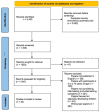Internalizing and externalizing symptoms in children during the COVID-19 pandemic: a systematic mixed studies review
- PMID: 37397311
- PMCID: PMC10313408
- DOI: 10.3389/fpsyg.2023.1182309
Internalizing and externalizing symptoms in children during the COVID-19 pandemic: a systematic mixed studies review
Abstract
Introduction: Given the vulnerability of children during the COVID-19 pandemic, paying close attention to their wellbeing at the time is warranted. The present protocol-based systematic mixed-studies review examines papers published during 2020-2022, focusing on the impact of the COVID-19 pandemic on children's internalizing/externalizing symptoms and the determinants thereof.
Method: PROSPERO: CRD42022385284. Five databases were searched and the PRISMA diagram was applied. The inclusion criteria were: papers published in English in peer-reviewed journals; papers published between January 2020 and October 2022 involving children aged 5-13 years; qualitative, quantitative, and mixed studies. The standardized Mixed Method Appraisal Tool protocol was used to appraise the quality of the studies.
Results: Thirty-four studies involving 40,976 participants in total were analyzed. Their principal characteristics were tabulated. The results showed that children's internalizing/externalizing symptoms increased during the pandemic, largely as a result of disengagement from play activities and excessive use of the internet. Girls showed more internalizing symptoms and boys more externalizing symptoms. Distress was the strongest parental factor mediating children's internalizing/externalizing symptoms. The quality of the studies was appraised as low (n = 12), medium (n = 12), and high (n = 10).
Conclusion: Gender-based interventions should be designed for children and parents. The studies reviewed were cross-sectional, so long-term patterns and outcomes could not be predicted. Future researchers might consider a longitudinal approach to determine the long-term effects of the pandemic on children's internalizing and externalizing symptoms.
Systematic review registration: https://www.crd.york.ac.uk/prospero/display_record.php?ID=CRD42022385284, identifier: CRD42022385284.
Keywords: COVID-19; MMAT; child; externalizing symptoms; internalizing symptoms; systematic mixed studies review.
Copyright © 2023 Levante, Martis, Bianco, Castelli, Petrocchi and Lecciso.
Conflict of interest statement
The authors declare that the research was conducted in the absence of any commercial or financial relationships that could be construed as a potential conflict of interest.
Figures
Similar articles
-
Parental worry, family-based disaster education and children's internalizing and externalizing problems during the COVID-19 pandemic.Psychol Trauma. 2021 May;13(4):486-495. doi: 10.1037/tra0000932. Epub 2021 Jan 21. Psychol Trauma. 2021. PMID: 33475409
-
Pre-pandemic socio-emotional vulnerability, internalizing and externalizing symptoms predict changes in hair cortisol concentrations in reaction to the COVID-19 pandemic in children.Psychoneuroendocrinology. 2022 Oct;144:105888. doi: 10.1016/j.psyneuen.2022.105888. Epub 2022 Aug 2. Psychoneuroendocrinology. 2022. PMID: 35933864 Free PMC article.
-
Systematic Review and Meta-Analysis: Early Irritability as a Transdiagnostic Neurodevelopmental Vulnerability to Later Mental Health Problems.J Am Acad Child Adolesc Psychiatry. 2024 Feb;63(2):184-215. doi: 10.1016/j.jaac.2023.01.018. Epub 2023 Feb 28. J Am Acad Child Adolesc Psychiatry. 2024. PMID: 36863413 Free PMC article.
-
Association of Screen Time With Internalizing and Externalizing Behavior Problems in Children 12 Years or Younger: A Systematic Review and Meta-analysis.JAMA Psychiatry. 2022 May 1;79(5):393-405. doi: 10.1001/jamapsychiatry.2022.0155. JAMA Psychiatry. 2022. PMID: 35293954 Free PMC article.
-
Beyond the black stump: rapid reviews of health research issues affecting regional, rural and remote Australia.Med J Aust. 2020 Dec;213 Suppl 11:S3-S32.e1. doi: 10.5694/mja2.50881. Med J Aust. 2020. PMID: 33314144
Cited by
-
Green Space and Internalizing or Externalizing Symptoms Among Children.JAMA Netw Open. 2024 Apr 1;7(4):e245742. doi: 10.1001/jamanetworkopen.2024.5742. JAMA Netw Open. 2024. PMID: 38598238 Free PMC article.
-
Psychological Impact of Distance Learning on Children and Adolescents in Saudi Arabia: A Multi-City Analysis of Behavioral and Mental Health Outcomes During the COVID-19 Pandemic.Children (Basel). 2024 Dec 20;11(12):1551. doi: 10.3390/children11121551. Children (Basel). 2024. PMID: 39767979 Free PMC article.
-
Noteworthy trends in maladaptive coping strategies and hindrances to help-seeking behaviour among adolescents living in Malaysia's People's Housing Project (PPR) during the COVID-19 pandemic: A qualitative study.PLoS One. 2025 Mar 21;20(3):e0318381. doi: 10.1371/journal.pone.0318381. eCollection 2025. PLoS One. 2025. PMID: 40117227 Free PMC article.
-
Trends in antipsychotic treatment of children and adolescents in Israel from post-mental health reform to post-COVID19 pandemic (2015-2023).Eur Child Adolesc Psychiatry. 2025 Apr 4. doi: 10.1007/s00787-025-02691-z. Online ahead of print. Eur Child Adolesc Psychiatry. 2025. PMID: 40185971
-
Smart Beginnings Predicts Reduced Externalizing Behavior Via Parental Negative Demeanor During Discipline.J Appl Dev Psychol. 2025 May-Jun;98:101796. doi: 10.1016/j.appdev.2025.101796. Epub 2025 Apr 23. J Appl Dev Psychol. 2025. PMID: 40330905
References
-
- Aarah-Bapuah M., Sarpomaa Oppong S., Ohenewaa Yawson A., Dzansi G., Adjorlolo S. (2022). Covid-19 and mental health of children and adolescents: a systematic review. Cogent. Psychol. 9, 2111849. 10.1080/23311908.2022.2111849 - DOI
-
- Achenbach T. M., Rescorla L. A. (2014). “The Achenbach system of empirically based assessment (ASEBA) for ages 1.5 to 18 years,” in The Use of Psychological Testing for Treatment Planning and Outcomes Assessment (London: Routledge; ), 179–214.
-
- American Psychiatric Association (2000). Diagnostic and Statistical Manual of Mental Disorders (DSM-IV-TR). Washington, DC: APA.
-
- Amorós-Reche V., Belzunegui-Pastor À., Hurtado G., Espada J. P. (2022). Emotional problems in Spanish children and adolescents during the COVID-19 pandemic: a systematic review. Clin. Health. 33, 19–28. 10.5093/clysa2022a2 - DOI
Publication types
LinkOut - more resources
Full Text Sources


